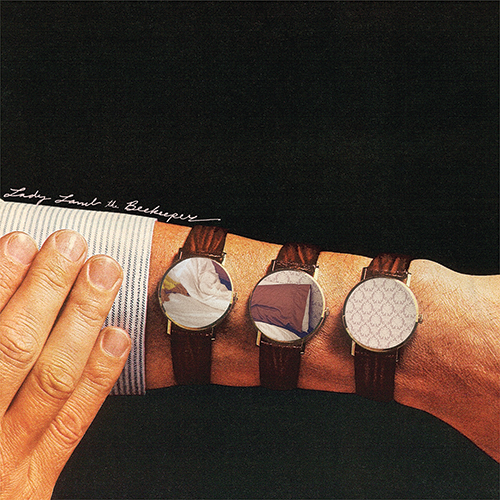There comes a time in every metal fan’s life when he or she must 86 the heavy—if only for a few minutes. Frankly, I’ve written so much about metal lately that I’ve turned my back on almost everything else. And while there’s plenty of good metal coming out right now, even the most blackened metal aficionado needs a break every once in a while. Enter: Lady Lamb the Beekeeper.
Greet the machine

There comes a time in every metal fan’s life when he or she must 86 the heavy—if only for a few minutes.
Frankly, I’ve written so much about metal lately that I’ve turned my back on almost everything else. And while there’s plenty of good metal coming out right now, even the most blackened metal aficionado needs a break every once in a while. Enter: Lady Lamb the Beekeeper.
With a name like this, you almost know what to expect immediately: one of those female-fronted bands with breathy, free-spirited vocals that sounds exactly like Florence and the Machine. In fact, aren’t those names just a little similar?
Though LLtB has been at it for quite some time, it is only now that their style is creeping across the nation to somewhat critical acclaim (and to the chagrin of some jaded music writers who are tired of concentrated bursts of similar product).
As much as I’d like to spoil the fun and label myself said jaded music critic, I cannot. LLtB’s newest, Ripely Pine, is certainly worth a listen, though it’s not without its formulaic hang-ups.
If there’s one thing to be said about Ripely Pine, it’s that the record forces what should come naturally to a project like this: dynamics. Sadly, the sole core member of LLtB, Aly Spaltro, has a lot of ideas that fall short—her melodies are mostly ill-conceived, though the arrangements on the record are mostly well done.
The lyrics repeat themselves in a lot of places—one can only use the word “nectarine” in a record so many times—but the cadence is good. There’s a lot of duality present on Ripely Pine and nine times out of 10 no two like elements are present together.
Simply put, either the songs are great or they are stinkers, regardless of how many tempo changes or unconventional instruments Spaltro can cram on a track.
Though there are smatterings of good ideas here and there, the mere fact that a great track can be sandwiched between two stale slices so often suggests an abundance of confusion.
The cuts on Ripely Pine stagger so much that after four tracks, you get the idea and now need to hear the whole thing. It’s pretty ingenious, if planned, but somehow I doubt it.
For example, “You are the Apple” is easily the best track on the record. The tracks before and after it, “Regarding Ascending the Stairs” and “Mezzanine,” respectively, are desolate
idea graveyards.
“Regarding” is essentially a cringe-worthy hip lineup of banjo and accordion that lacks any kind of seasoning whatsoever, and “Mezzanine” is a four-minute buildup that never goes anywhere.
True to form, the songs before and after these cuts are good. The amplitude of quality is a complete turnoff, and some paring would perhaps have helped the release immensely.
The arrangement quality and interesting ideas on every other track are the two epoxy compounds that hold this record together, and though it pains me to say it, Ms. Spaltro needs to slow her roll just a little.
Some of the best passages on Ripely Pine occur when she isn’t hollering over them, and because she’s on 95 percent of the album, there’s a whole lot of ego-stroking in favor of listenability.
Ripely Pine
Ba Da Bing! Records
Out now
2.5/5 Stars
Small musical sproutlings that are on the verge of serious growth are stepped on and mashed in the dirt by a vocalist who doesn’t know when to hold back and when to just go for it.
There are some wonderful vocal passages, so the entirety isn’t a disaster: “Bird Balloons” has some very dynamic, enthralling vocal work, as does “Little Brother” and the aforementioned “You are the Apple.”
Track 11, “The Nothing Part II,” has a very delicate vocal line that meshes with the music so well that it’s a shame the record is nearly over by the time it begins.
To Spaltro’s credit, a glaring reason that the vocals are sometimes unbearable is the mixing job. Everything is so open that the instruments sound hollow over Spaltro’s overmixed vocals.
The vocals sit so high in the mix that the listener might even have to use an equalizer, something no one should ever have to do, under any circumstances. This is why the parts without Spaltro sound so good: Without her overbearing vocals, the instruments finally get a chance to breathe for a few seconds.
Let’s talk beginnings and endings: The opening track, “Hair to the Ferris Wheel,” kicks
off the odd-numbered-tracks-are-the-good-ones motif. After a lengthy introduction by a mostly unaccompanied Spaltro, the band washes in, and the result is a decent neo-folk rock track complete with gnarly fuzz and guitar feedback.
The ending is an even number, and thus, the opposite of what it should be—gone is the dynamism, in its place a hastily cobbled-together audio sketchbook. It has almost zero cohesion or underlying theme. It’s just there.
This isn’t to say Ripely Pine is bad—just that half of it is. The tracks that are tolerable seem to feature more buried vocal production, which is exactly what a record like this needs. Perhaps that’s one dynamic element that just shouldn’t be: poor production.






